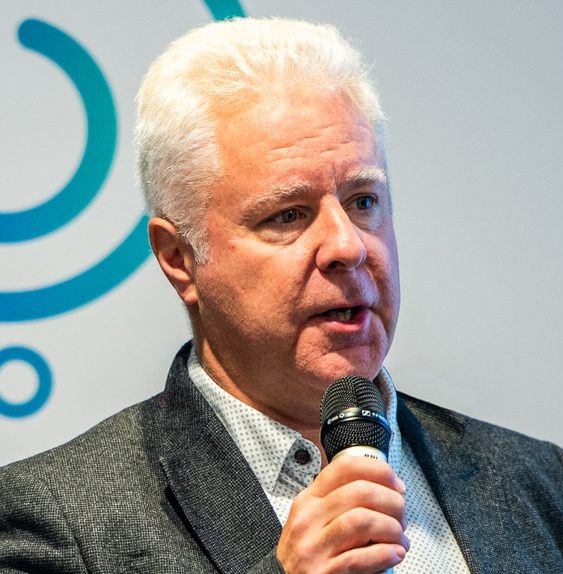TechWorks’ roots as a trade association set up by semiconductor companies who saw the need for a body that would represent their interests began life as National Microelectronics Institute (NMI) in 1996 before rebranding to TechWorks in 2013. It was established in Glasgow. At the time, the ‘Silicon Glen’ was in full flow, a term given to the high tech sector in Scotland. It referred to a patch of area between Dundee, Inverclyde and Edinburgh, where electronics companies set up their facilities.
Since that time – when Ferranti established a plant in Edinburgh, alongside Marconi Company and Barr & Stroud, all companies that either no longer exist or operate under these names – the Silicon Glen has been in serious decline. This short snapshot of its history reflects the sorry state of semiconductor manufacturing in the UK, which no longer has a strong presence on a global stage.
“As you get older, you get more and more interested in history,” said Charles Sturman, CEO of TechWorks. “Because you could say, well it doesn’t matter why. You know, here we are, what we’re going to do, but … I think you can learn from your past mistakes.”
Sturman was appointed CEO in 2023 and hopes to revive the fortunes of the UK chip industry “before it disappears down the back of the U end forever”, as he termed it. Today, TechWorks has 300 member companies and oversees 5 sub-bodies spanning manufacturing, automotive, IoT Security, and power electronics: AESIN, its automotive arm was launched in 2012 in response to the use of electronics exploding in cars, and IoT Security Foundation was launched in 2014 as IoT began to pick up pace.
Sturman’s own background in electronics engineering who later moved into chip design in recognition that the circuit design was going to move into the chip, has seen him work at Acorn Computer, u-blox, and Huawei.

Why semiconductors are worth caring about
In December 2024, TechWorks published a whitepaper, Semi35, in which it acknowledged a general decline in UK manufacturing, and zeroed in on semiconductors. It posited that companies and countries that lead in technologies like semiconductors but also AI, have a “unique geopolitical power”, with NVIDIA serving as an example of a huge success story. NVIDIA became the first to hit a $4 trillion valuation in July 2025.
“The beginning of that paper is trying to set the rationale of, why do you care?” said Sturman.
To answer this question, it’s important to acknowledge how foundational semiconductors have become in many of the devices and consumer electronics we interact with in our daily lives – even extending to the cars we drive – as well as in critical infrastructure like defence and communication systems.
“The fabric of our society is built on top of semiconductor devices,” Sturman stressed. “We rely on electronic systems for our very existence. If somebody infiltrates those chips, or if somebody disrupts that, it has an impact on people’s lives.”
These are the stakes which TechWorks and others have set out, compounded by the fact that the UK is especially susceptible to attacks on or disruption on the global semiconductor industry because it outsources its chips, with Taiwan being a major supplier. The 2020-2023 global chip shortage evidenced this.
The reasons for the UK’s declining position are complex and multi-layered. Predominantly, there is not enough money and investment being poured into its semiconductor industry, and currently places like the US, China, and Taiwan are leading on technological innovation.
Besides investment, Sturman also cited the growth of fabless as a model which naturally led to outsourcing and finding the best deal. The speed at which consumer electronics have been manufactured and released alongside Moore’s Law – which dictates an increase in transistors and subsequently more performance – has made silicon that much more valuable.
“It makes the commoditisation of silicon even more expressed, even more marked,” explained Sturman.
Finally, the UK’s risk-averse and short-term mindset have affected competitiveness in the silicon industry, which also extends to banks and VCs, the latter of which favour short-term investments, according to Sturman.
“Once you invest at Series A and Series B and Series C, if you can’t follow on with your investment, you will get diluted to nothing,” explained Sturman. “So if you do the maths, if you’re going to invest in long-term, 5, 6, 7 year minimum returns … if you look at chip companies, the VC is not going to get their money back for 10 years plus.”
This ultimately means that less investment is set aside for semiconductor companies looking to scale and grow in the UK. Sturman noted that he’d observed a kind of ‘Silicon Valley’ mindset where a strong ecosystem means companies are bound to bump into one another and that natural networking is valuable for businesses, the likes of which is not seen in the UK.
How the UK can become more competitive
This means the next question, fundamentally, is: what can the UK do, then, to be more competitive?
Recommendations Sturman put forth included encouraging STEM as a career path and reassuring students who go into it that there will be employment at the end of a degree is one such recommendation.
“You need to build the roads so people can drive down them,” said Sturman. “It’s no good shoving anymore. It’s no good giving bursaries to students to attract them to do electronic engineering if they can’t get a job afterwards.”
The UK government’s impulse is not to be interventionist in matters like falling numbers of students studying STEM, however other countries were doing this and succeeding, which could be an indicator that interventionist policies addressing this may be fruitful, Sturman said.
Another recommendation is to lean into the UK’s existing strengths and capabilities in analog and digital design, and identify opportunities in areas such as neuromorphic computing and photonics.
“We have 30 fabs now, arguably not all of them are in a strong position, but arguably half of them, at least, are in a strong position, and with the right support, which is what that paper [Semi35] is asking for, they could grow,” said Sturman.
Semi35, which TechWorks published, put forth a five-point strategy:
- Invest to grow globally successful chip companies
- Provide scale-up support for UK manufacturers
- Incentivise domestic demand
- Create a UK pilot line and innovation facility
- Establish a design competence centre
“We really need to do part two [of Semi35],” said Sturman. “The idea was to do a much bigger paper, and then [the] Department for Science, Innovation and Technology said to us that they were about to launch the Industrial Strategy.”
As part of the UK’s Industrial Strategy, which was released in 2025, the government said that it wanted to utilise its expertise in chip design to create next-generation chips and position the UK at the cutting edge. More generally speaking, it aims to back advanced manufacturing with up to £4.3 billion of funding.
He added that the role of TechWorks is not to be a lobbying organisation, but to work with the government. “We will always talk to the government and say, ‘Look, we;re working on this. This is what it is going to be about … If you have a valid comment, we’ll take that on board.’. They said, this is great. Could you get this done in time for the green paper consultation, because we could feed it in.”
In summarising the state of the UK semiconductor industry, Sturman didn’t sound completely downcast, but highlighted the importance of focusing on semiconductors: “We’re at a crossroads. There’s a lot of potential and opportunity across the UK, and the next few years will dictate whether we take the right path to scale … or the wrong path to a steady decline.
“And to some extent, that depends on [the] industry making the right calls. To some extent, it depends on financial support, whether that’s from private or public markets.”







